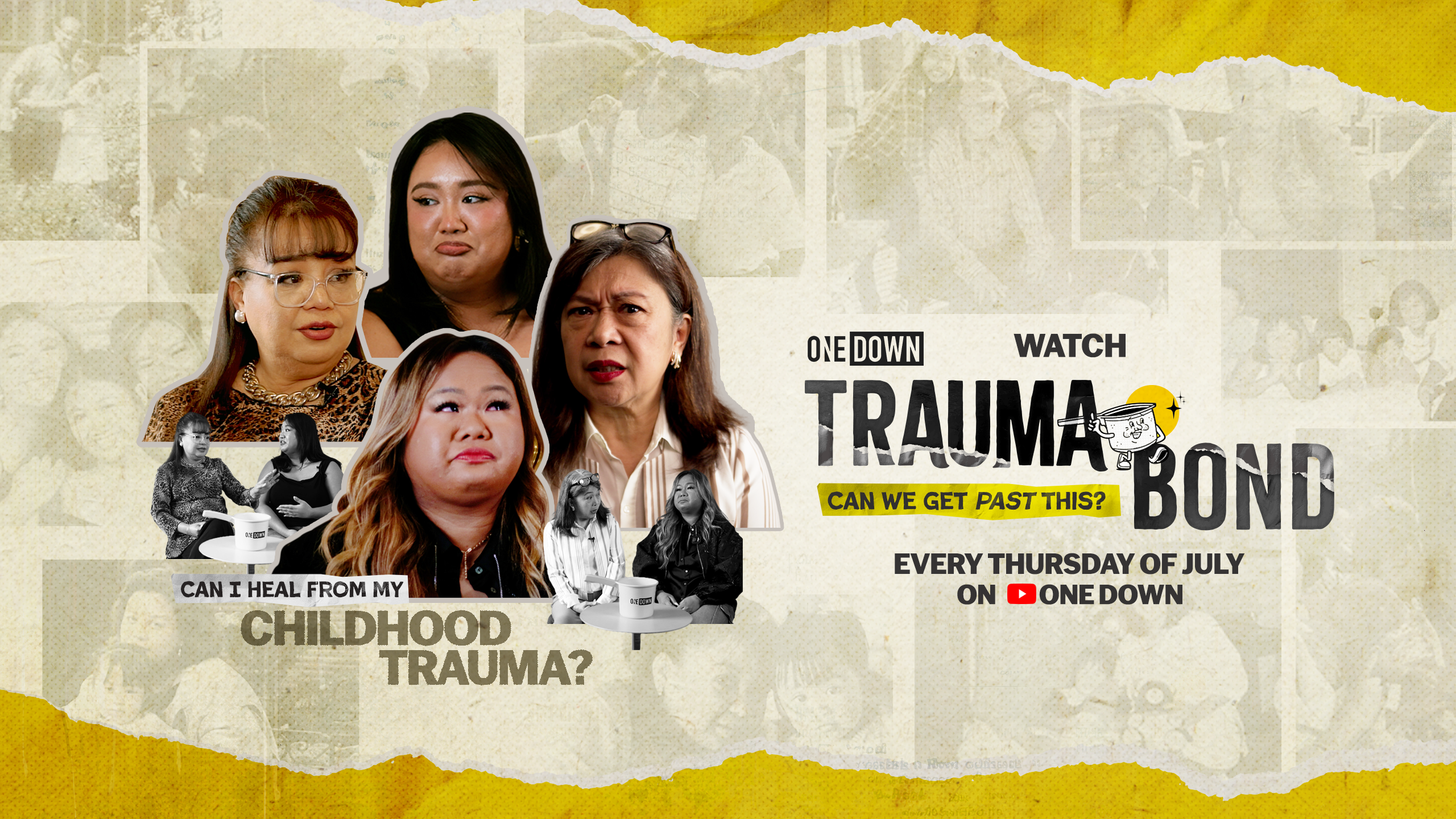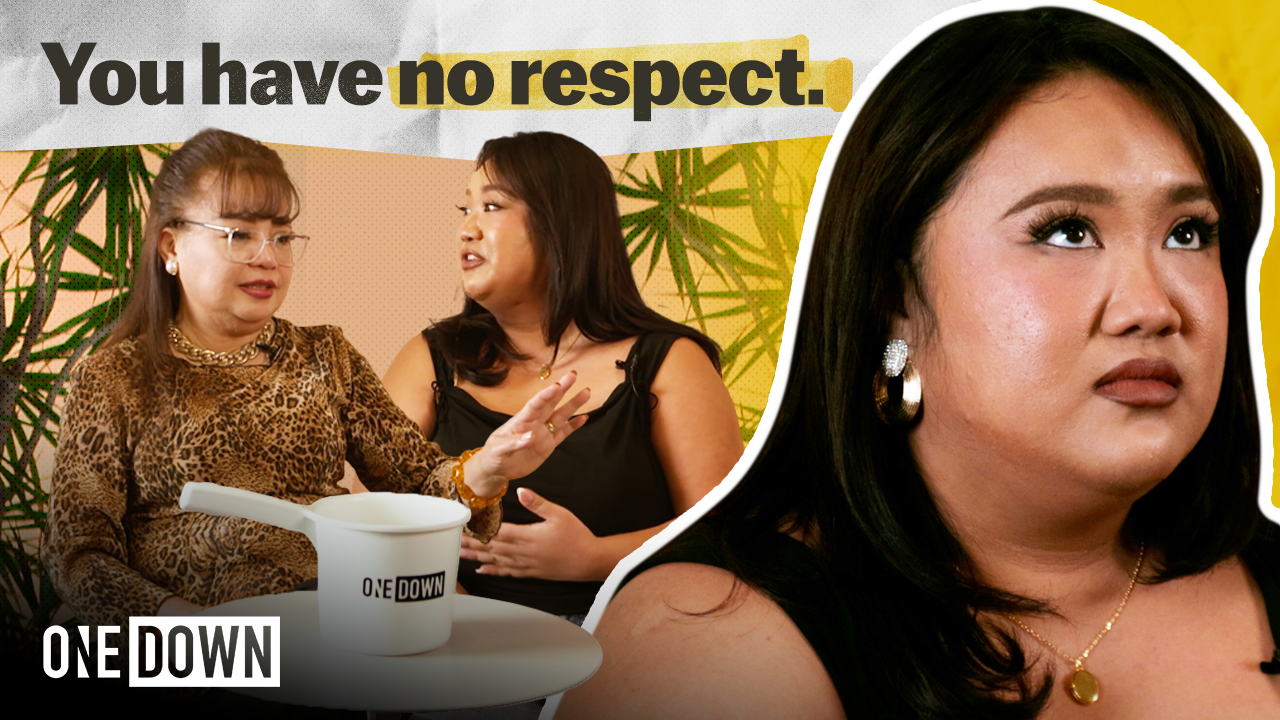Trauma Bond: Addressing Generational Trauma Through Tabo(o) Topics
Trauma Bond: Can We Get Past This? Photo: One Down Media
Communication is the root of truth and understanding. Without it, relationships have the potential to fall into a deep and oftentimes inescapable void that is vacuous and misguided.
One Down, a Filipino American media company with its home base in Los Angeles, examines the complexities of communication that influence both the cultivation and destruction of generational trauma in their new series, Trauma Bond.
The series’ slogan, Can We Get Past This?, cleverly italicizes and emboldens the central role that the past plays as a constant tormentor with the potential to corrupt the mind into shaping a concern-laden present and tainted future. One must address the issues of the past in order to get through the existing traumas it has formed. In most facets of life, most especially relationships as valuable and inextricably connected as mother and child, evolving cannot be fully realized without taking ownership of the past. Trauma Bond addresses the necessity for conversations of accountability and recognition through the existence of the series itself. Utilized perfectly in the two episodes is the ‘tabo takes’, which revitalizes a classic Filipino object to address issues often cringed at and left untouched by parent and child, dismantling subjects seen as taboo by older generations.
I Confront My Mom on my Childhood Trauma | Trauma Bond. PHOTO: One Down Media
The first episode of Trauma Bond highlights the connection between single mother Pinky and her eldest daughter Tessa. Unsurprising to witness is the evident strength and shielded nature of Pinky, who, similar to most Filipino mothers, wields an uncanny fierceness impenetrable by discussions of their own trauma and only broken down by one thing: realizing that they may have caused trauma for their own.
Throughout her episode of Trauma Bond, Tessa recounts enduring demeaningly insensitive remarks on body size through “tabachoy” comments [which, the writer of this article has acutely relates to]. In the far less sensitive and acutely aware world that Pinky lived in, being called chubby, fat, and pinching cellulite peeking through tops was rationalized as playful and innocent. Any reaction other than a laugh or giggle was seen as a reflection of the individual being fragile and thin-skinned. Now, Tessa makes her mother aware that commenting on bodies should and will always be frowned upon.
Pinky's openness and ability to truly listen to her daughter were certainly refreshing and indicative of her desire to remain close to Tessa, made possible by their newfound communication while discussing tabo takes. Both Tessa and Pinky realize they belong to the same “side” no matter what the generational difference, which is superseded by their love for each other.
I Called Out My Controlling Mom | Trauma Bond. PHOTO: One Down Media
The second episode of Trauma Bond introduces Jeanalyn and her eldest daughter Jazmine, who undoubtedly exudes the meaning of being an “ate” with each smile, masking reserved pains for the sake of being a pillar for her mother and two sisters.
Jeanalyn begins by recounting her childhood and accepting the indelible mark her parents impressed in establishing the foundation for her own children, which, as any Filipino would anticipate, is rooted in religiousness and a strong matriarch, who convinced her to abandon her life in the Philippines for the life she planned in America. Now, Jeannie, as Jazmine fondly nicknames her, prioritizes a conscious effort to avoid her own mother’s mistakes in raising the three girls.
Being the first child meant that Jeanalyn learned to parent through raising Jazmine. Grappling with childhood wishes and mixed feelings about strict parenting left Jazmine in the particular and specific dilemma of many ates: Trying to dismiss past pains when witnessing the childhood they wanted to experience is instead enjoyed by their younger siblings.
Jeanalyn and Jazmine’s conversation is a poignant reminder of the necessity to extend grace and understanding to parents. Everything mothers, fathers and guardians experience with their firstborn is new ground only being covered. Thus, they try to raise their own in ways that emulate their own childhood, as a reflection of their identity, whether good or bad. After all, the basis of each person's identity, and ultimately, the foundation of those they raise, is created by who they have been molded to be by those before them. Looking beyond the roles of parent or child and acknowledging one another as learning individuals allows for each person to truly be seen.
Between the two episodes, interpretation becomes a central focal point in the pain, tension, and misunderstandings between the mothers and daughters. Witnessing the reconciliation of hearts as each episode progressed drew me back to analyze my own relationship with my mother and heightened, if even possible, the gratitude and love I feel for her willingness to delve into conversations that can be uncomfortable, but true and necessary. Impenetrable bonds, such as the one shared by me and my mom, are not formed by dismissiveness, pain disguised as quips, or ego-driven emotion, but a receptiveness and sincere intent to understand each other together. It is a gift to understand the identity of my mom beyond her most prized role as a nurturer, and seeing her as a human who is learning alongside me. As Tessa and Jazmine read the tabo takes and read their mothers responses, they too shared in my own realization.
Sooner or later, a reversal of roles will occur when it becomes time for the child to tenderly care for the parent with the same delicacy as they once held. Addressing generational trauma allows the child to wholeheartedly give gratitude and respect to those who raised them, while being confident in their ability to eventually care for the next generation.
One Media’s new series calls to people to listen and hear one another, which allows for a deeper bond that equips parent and child to overcome shared trauma, allowing life to propel in search of growth rather than healing.
Watch One Down’s new series, Trauma Bond, streaming on Youtube every Thursday of July!
Platform: https://www.youtube.com/@onedownmedia
Please note: One Down calls all viewers, who resonate with Trauma Bond, to visit https://bit.ly/sweetmangotherapy for a free 15-minute consultation with a licensed mental health professional!
Bahala Na: A Brand, A Phrase, A Lifestyle
In Conversation with Kris and Kate Paguinto, the founders of Bahala Na who embody the meaning of the phrase by intertwining Filipinx culture with fashion-forward street style unique to Los Angeles.
Clothing has the ability to tell a larger story and to speak volumes about cultural beliefs and historical change. When wearing a piece, it signifies a unique component of our identity and the fabric of our society as a whole. Kris and Kate Paguinto have intertwined Filipino culture with fashion-forward street style through Bahala Na, a Los Angeles-based lifestyle brand.
Realizing Bahala Na was conceptualized with the hopes of manifesting the message of the phrase, meaning “whatever happens, happens,” onto an effortlessly chic tote bag, one that Kate had been searching for. In true entrepreneurial nature, when the product isn’t out there, you make it yourself. Bahala Na was born with a full investment in amplifying the Filipino voice. “We felt like there was a shortage of Filipino-owned brands that were actually like Filipino representation, like a lot of the brands that we were following, that we really loved that we're Filipino-owned, were not specifically catering to the Filipino audience.”
What Started It All: Bahala Na Tote Bag by Bahala Na
Bahala Na thrives off of being a brand that is sibling-run, staying true to the quintessential family dynamics that are a pillar of Filipino values, and highlighting the common household saying that family is everything. Being twins has allowed Kris and Kate to move in sync, complementing each other and having distinct identities that, combined, make for a special, inimitable force aligned with the brand. More than that, such intuitiveness distinct to a relationship between twins has allowed the identical twins to have a magnetic connection not only between themselves but also with consumers.
Manila-born and California-raised, the Paguinto twins reminisced on their specific upbringing, with two urban city “homes” that serve as the essence of each clothing item. An “Filipino Angelino kind of fusion,” as Kate calls it, Bahala Na caters to the quintessential street style lauded throughout LA, with quotes drawing Kapamilya to find community through shared words. People responded quickly to the new brand that the content creators established, with a movement of the Filipino community coming along from their journey as content creators to empowered designers motivated by their culture in hopes of forming culture.
Never to be underestimated is the brand’s ethos, with the selection of the phrase Bahala Na exuding an effervescent nature of navigating life with the mindset of acceptance amidst the constant ebbs, flows, and rapidly shifting nature of change. The phrase not only depicts how Kris and Kate try to live their lives but also the way they run their shared business as they express their desires to “ [go] with the flow and [pivot] where you need to, and just enough to know that you're capable of doing whatever needs to be done." Staying nimble, open, and creative is made possible by gracefully straying from the plan on occasion. The Paguinto Twins’ allowance of community, surroundings, and environment has propelled their success in unimaginable ways through the underestimated value of listening to intuition and the flat-out desires stated by consumers. Such callings of flexibility and fluidity have led Kris and Kate to empower themselves as business owners by utilizing their superpower: the “Bahala Na” lifestyle.
Such sentiments about the desire to satisfy their own wishes of seeing their culture printed and worn are shared by their 5,000 followers on Instagram. The buzz amongst the Filipino community in seeking their culture out in apparel has made pop-ups the perfect environment for the brand to connect directly with loyal supporters or intrigued culture-sharers strolling through markets specifically organized to intensify the AAPI voice. Pop-up markets, according to Kate and Kris, have served as a central hub for the community to share one space. Seeing consumers face-to-face allows for the most learning and growth through observation as they flip through vintage tees and converse about poignant moments brought to mind with each shirt. Resources, connections, and like-minded, passionate individuals come as gifts to Kris and Kate, who cherish relationships as a strong component of not only the brand's success but also their personal fulfillment.
Paguinto Twins in the honk if you ❤ jeepney drivers Tank Top by Bahala Na
Important to the Paguinto twins is being a resource and offering a space for critical platforms to have a voice. The “Honk if You Love Jeepney Drivers” tank, a special Bahala Na piece, represents the nature of Filipinos to manifest perseverance into creativity, with the jeepney itself being a testament to the resourcefulness that morphed World War II Jeeps into such a pivotal symbol in culture. To show their support for the artistic spirit that the Jeepney is emblematic of, Kris and Kate worked with the Tangol Passada Network, an organization raising funds against the Jeepney phaseout. Consumers who bought the tee not only have something tangible and stylish in their desire to express love for the Jeepney, but have also contributed to the Paguinto twins pledge to donate 20% of all proceeds to TPN. Highlighting different aspects of Filipino culture and bringing awareness to central issues, “home” is the embodiment of the power and impact of a purposeful and vivid vision.
Hayop Ka Tank Top by Bahala Na
Visiting the homeland and soaking in the pristinely crystal-clear Philippine waters invigorates the inspiration and creativity behind the brand, described by Kate as a “cleansing” of mind and soul. Being “home” means full immersion into the Tagalog language and learning the context of certain phrases, sayings, and slang that make for the best tees. Of the many phrases beloved by Filipinos, the duality of Hayop Ka inspired Kris and Kate to transform the humorous and derogatory expression, meaning “you are an animal,” into a sensual and complex state of being in love with the use of soft cursive lettering. The femininity and sweetness of the font and style at first glance of the tee speak to one of the main tenets of the Bahala Na: reclaiming facets of life seen as negative and bringing humanity to the forefront. Allowing oneself to be shameless and embracing the culture, dialect, language, and accent that are beautifully Filipino remains the beating heart of Kris and Kate’s decisions as founders of the brand and ushers of a newer generation of empowered Filipinos.
And so, we circle back to the brand’s name itself. Bahala Na.
A distinct phrase turned into a brand by Kris and Kate Paguinto, two people who promote the Bahala Na lifestyle.
Allow change and continuity to unfold through endless curiosity, creativity, and taking that leap of faith while knowing that whatever happens, happens. Come what may.








